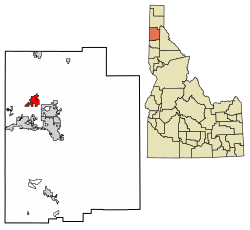Rathdrum, Idaho
 From Wikipedia - Reading time: 7 min
From Wikipedia - Reading time: 7 min
Rathdrum, Idaho | |
|---|---|
 Old County Jail Museum | |
 Location of Rathdrum in Kootenai County, Idaho. | |
| Coordinates: 47°48′30″N 116°53′35″W / 47.80833°N 116.89306°W | |
| Country | United States |
| State | Idaho |
| County | Kootenai |
| Area | |
| • Land | 6.54 sq mi (16.9 km2) |
| Elevation | 2,215 ft (675 m) |
| Population (2020) | |
• Total | 9,211 |
• Estimate (2023) | 11,580 |
| • Density | 1,408.4/sq mi (543.8/km2) |
| Time zone | UTC-8 (Pacific (PST)) |
| • Summer (DST) | UTC-7 (PDT) |
| ZIP code | 83858 |
| Area code | 208 |
| FIPS code | 16-66340 |
| GNIS feature ID | 2411521[2] |
| Website | www |
Rathdrum is a city in Kootenai County, Idaho, United States. The population was 9,211 at the 2020 census, up from 6,826 in 2010.[3] It is part of the Coeur d'Alene Metropolitan Statistical Area, which includes the entire county. It is named after Rathdrum, a village in County Wicklow, Ireland.
According to the United States Census Bureau, the city has a total area of 6.54 square miles (16.94 km2), all land.
Rathdrum is situated at the base of Rathdrum Mountain, which is part of the Selkirk Mountain Range.
History
[edit]
In the 1800s the town was initially called Westwood in honor of one of the founders of the town, a Pony Express rider and rancher, Charles Wesley Wood, also known as "Wes." But in 1881 the postmaster in the town was informed by the federal government that the town would need to change its name since it was already taken by another town in the territory. A local businessman, Michael M. Cowley, recommended the name "Rathdrum" from County Wicklow in Ireland, his place of birth.[4]
Near the end of the 19th century, the Northern Pacific Railway built its line westwards to Spokane and Rathdrum started to grow slowly. Until today, Rathdrum remains on the only regular railway line in Idaho, now owned by BNSF Railway; the Empire Builder of Amtrak travels through Rathdrum without stopping there.
Demographics
[edit]| Census | Pop. | Note | %± |
|---|---|---|---|
| 1890 | 218 | — | |
| 1900 | 407 | 86.7% | |
| 1910 | 725 | 78.1% | |
| 1920 | 509 | −29.8% | |
| 1930 | 496 | −2.6% | |
| 1940 | 511 | 3.0% | |
| 1950 | 610 | 19.4% | |
| 1960 | 710 | 16.4% | |
| 1970 | 741 | 4.4% | |
| 1980 | 1,369 | 84.8% | |
| 1990 | 2,000 | 46.1% | |
| 2000 | 4,816 | 140.8% | |
| 2010 | 6,826 | 41.7% | |
| 2019 (est.) | 9,150 | [5] | 34.0% |
| U.S. Decennial Census[6] | |||
2020 census
[edit]As of the census of 2020, there were 9,211 people in the city. The population density was 1,408.4 inhabitants per square mile (543.8/km2). The racial makeup of the city was 87.6% White, 0.0% African American, 0.5% Native American, 1.1% Asian, 1.8% Pacific Islander, 6.5% from two or more races, and 4.8% Hispanic or Latino.
See also
[edit]References
[edit]- ^ "2019 U.S. Gazetteer Files". United States Census Bureau. Retrieved July 9, 2020.
- ^ a b U.S. Geological Survey Geographic Names Information System: Rathdrum, Idaho
- ^ "U.S. Census Bureau QuickFacts".
- ^ How an Irish pioneer named the town of Rathdrum, Idaho after his village Irish Central, 6 Feb 2015
- ^ "Population and Housing Unit Estimates". United States Census Bureau. May 24, 2020. Retrieved May 27, 2020.
- ^ "Census of Population and Housing". Census.gov. Retrieved June 4, 2015.
External links
[edit]- Official website - City of Rathdrum
- Rathdrum Chamber of Commerce
- Lakeland Joint School District #272 - public schools
- FYI North Idaho.com - Rathdrum
- The Rathdrum Star[usurped] - weekly newspaper
 KSF
KSF
